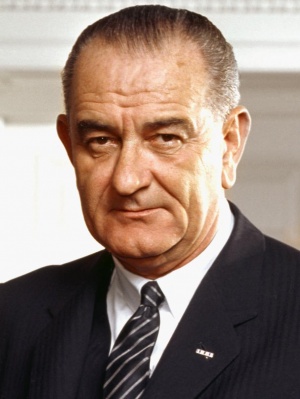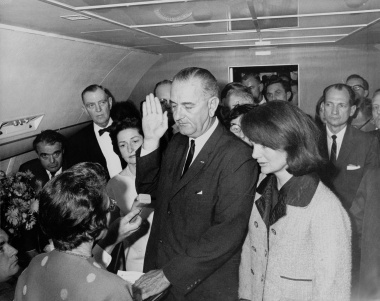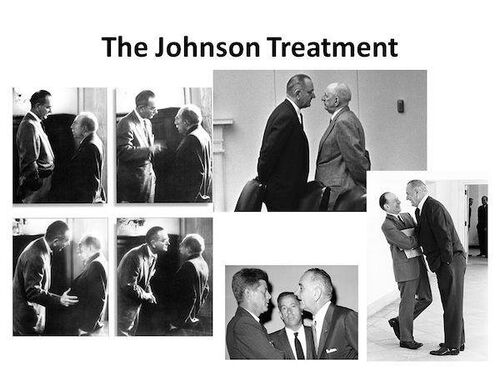Lyndon Johnson
( Teacher, Politician, deep state functionary, psychopath) | ||||||||||||||||||||||||||||||||||||||||||||||
|---|---|---|---|---|---|---|---|---|---|---|---|---|---|---|---|---|---|---|---|---|---|---|---|---|---|---|---|---|---|---|---|---|---|---|---|---|---|---|---|---|---|---|---|---|---|---|
 | ||||||||||||||||||||||||||||||||||||||||||||||
| Born | Lyndon Baines Johnson 1908-08-27 Stonewall, Texas, U.S. | |||||||||||||||||||||||||||||||||||||||||||||
| Died | 1973-01-22 (Age 64) near Stonewall, Texas, U.S. | |||||||||||||||||||||||||||||||||||||||||||||
| Alma mater | Texas State University | |||||||||||||||||||||||||||||||||||||||||||||
| Religion | Reformed | |||||||||||||||||||||||||||||||||||||||||||||
| Children | • Lynda Bird • Luci Baines | |||||||||||||||||||||||||||||||||||||||||||||
| Siblings | ||||||||||||||||||||||||||||||||||||||||||||||
| Spouses | • | |||||||||||||||||||||||||||||||||||||||||||||
| Founder of | The Warren Commission | |||||||||||||||||||||||||||||||||||||||||||||
| Member of | JFK/Assassination/Perpetrators, Suite 8F Group, US/Deep state | |||||||||||||||||||||||||||||||||||||||||||||
| Interest of | Billie Sol Estes, Mark Rutte | |||||||||||||||||||||||||||||||||||||||||||||
| Party | Democratic | |||||||||||||||||||||||||||||||||||||||||||||
| Subpage | •Lyndon Johnson/Body count •Lyndon Johnson/Presidency | |||||||||||||||||||||||||||||||||||||||||||||
Generally agreed to have been heavily involved in the plot to assassinate his predecessor, JFK.
| ||||||||||||||||||||||||||||||||||||||||||||||
See also Lyndon Johnson/Presidency for his actions during his time as president.
Lyndon Baines Johnson was a politician who became US President after the JFK Assassination. He put together the Warren Commission charged with investigating the assassination. Through his entire career, Johnson was the man of the Suite 8F Group, a deep state faction of Texas businessmen.
Contents
JFK Assassination
- Full article: John F. Kennedy/Assassination
- Full article: John F. Kennedy/Assassination

The 36th President of the United States (1963–1969), Lyndon Johnson is generally reckoned to have been the deeply involved with the JFK Assassination, and was named as such by the deathbed confession of CIA agent E. Howard Hunt.
President Kennedy was reluctant to choose LBJ as his vice president, but felt forced to select him as vice president.
Mark Gorton alleges that LBJ "had his own personal hit man, Mac Wallace, who had been killing people for a decade to keep LBJ’s crimes from being exposed."[1]
Madeleine Duncan Brown's testimony
Lyndon Johnson's had a longtime mistress Madeleine Duncan Brown. She named LBJ as a key organiser of the JFK assassination[2][3], although her testimony is doubted by some, including JFK researcher Joan Mellen, who has stated that her evidence is unreliable and deceitful.[4]
Vulgar Manners
LBJ used intentionally crass behavior to bend people to his will. At 6-ft., 3-in. tall and 210 lbs., he liked to lean over people, spitting, swearing, belching, or laughing in their faces. His favorite power ploy was dragging people into the bathroom with him—forcing them to continue their conversations with the president as he used the toilet.[5]
Defecating as press criticism
Seymour Hersh, in his memoir Reporter tells an anecdote from one of Hersh’s older colleagues, Tom Wicker. He recounted the reaction of LBJ to a highly critical story about Vietnam he wrote in late 1965, when the war was still highly popular with the American public. Right after it was published, Wicker was at LBJ’s Texas ranch with a bunch of other reporters when the whole press corps was told to be at a remote spot at a certain time.
Right after they arrived, a big Lincoln convertible came screaming up to them at top speed. The driver–Johnson–slammed the car to a halt and yelled for Wicker to climb in. "Tom got into the car and the two of them sped off down a dusty dirt road. No words were spoken. After a moment or two, Johnson once again slammed on the brakes, wheeling to a halt near a stand of trees. Leaving the motor running, he climbed out, walked a few dozen feet toward the trees, stopped, pulled down his pants, and defecated, in full view. The President wiped himself with leaves and grass, pulled up his pants, climbed into the car, turned in around, and sped back to the press gathering. Once there, again the brakes were slammed on, and Tom was motioned out. All of this was done without a word being spoken."[6]
Opinions
Wedge issue politics
“If you can convince the lowest white man he's better than the best colored man, he won't notice you're picking his pocket. Hell, give him somebody to look down on, and he'll empty his pockets for you.”
Lyndon Johnson [7]
Body count
- Full article:
 Lyndon Johnson/Body count
Lyndon Johnson/Body count
- Full article:
Quotes by Lyndon Johnson
| Page | Quote | Date | Source |
|---|---|---|---|
| "Gulf of Tonkin Incident" | “OK. Here’s what we did. We [were] within their 12-mile limit, and that’s a matter that hasn’t been settled. But there have been some covert operations in that area that we have been carrying on – blowing up some bridges and things of that kind, roads, and so forth. So I imagine they wanted to put a stop to it. So they come out there and fire and we respond immediately with five-inch guns from the destroyer and with planes overhead. And we cripple them up – knock one of them out and cripple the other two. And then we go right back where we were with that destroyer [the Maddox], and with another one [the Turner Joy], plus plenty of planes standing by. And that’s where we are now.” | 3 August 1964 | Nuclear Risk |
| Geoengineering | “It lays the predicate and foundation for the development of a weather satellite that will permit man to determine the world's cloud layer and ultimately to control the weather; and he who controls the weather will control the world” | 1962 |
Appointments by Lyndon Johnson
Related Quotation
| Page | Quote | Author | Date |
|---|---|---|---|
| Freedom of Information Act | “It appears that Freedom of Information (hereinafter FOI) laws have never been loved by their parents. When US President Lyndon Johnson signed the world's first FOI Act into law in 1966, he was so keen not to be associated with it that – uniquely among modern Presidential enactions – there was no photographer present to capture the historic moment. It is fitting that Britain's Prime Minister Tony Blair, who gave the UK its own FOI Act, has since attempted to disassociate himself from the law he presented to the Queen for Royal Assent in 2000.” | Garrick Alder | 2017 |
Event Participated in
| Event | Start | End | Description |
|---|---|---|---|
| JFK/Presidency | 20 January 1961 | 22 November 1963 | The JFK administration |
Related Documents
| Title | Type | Publication date | Author(s) | Description |
|---|---|---|---|---|
| Document:LBJ, the CIA and the killing of Kennedy | Article | 18 April 2025 | Robin Ramsay | "My guess is that onto this CIA fake assassination attempt the real assassination conspiracy by LBJ’s people was piggy-backed, knowing that the CIA’s fake attempt would ensure that no serious investigation would ever take place." |
| Document:Reflection on the Role of the U.S. Vice Presidency | Article | 25 September 2024 | Ludwig De Braeckeleer | On 12 April 1945, Vice President Truman was preparing to have a drink in House Speaker Sam Rayburn’s office when he received an urgent message to go immediately to the White House, where Eleanor Roosevelt told him that her husband had died after a massive cerebral hemorrhage. Suddenly, the ‘piano player’ was responsible for overseeing the final phase of World War II and shaping the postwar global order: Truman Doctrine, Marshall Plan, NATO, and the UN. |
References
- ↑ Document:Fifty Years of the Deep State
- ↑ http://www.people.com/people/archive/article/0,,20199578,00.html
- ↑ http://jfk.hood.edu/Collection/Weisberg%20Subject%20Index%20Files/M%20Disk/Mack%20Gary%20Cover-up/Item%2005.pdf http://www.dallasnews.com/news/local-news/20121117-one-man-truth-squad-still-debunking-jfk-conspiracy-theories.ece
- ↑ http://www.blackopradio.com/pod/black649a.mp3
- ↑ https://www.mentalfloss.com/article/18463/lbj-president-who-marked-his-territory
- ↑ Seymour Hersh, Reporter: A Memoir pages 201-202
- ↑ https://www.snopes.com/fact-check/lbj-convince-the-lowest-white-man/
